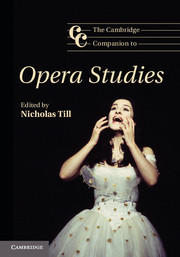Book contents
- Frontmatter
- Contents
- Contributors
- Acknowledgements
- Introduction: opera studies today
- Part One Institutions
- Part Two Constituents
- 4 ‘Too much music’: the media of opera
- 5 Voices and singers
- 6 Opera and modes of theatrical production
- 7 Opera and the technologies of theatrical production
- Part Three Forms
- Part Four Issues
- Further reading
- Index
- References
6 - Opera and modes of theatrical production
from Part Two - Constituents
Published online by Cambridge University Press: 05 December 2012
- Frontmatter
- Contents
- Contributors
- Acknowledgements
- Introduction: opera studies today
- Part One Institutions
- Part Two Constituents
- 4 ‘Too much music’: the media of opera
- 5 Voices and singers
- 6 Opera and modes of theatrical production
- 7 Opera and the technologies of theatrical production
- Part Three Forms
- Part Four Issues
- Further reading
- Index
- References
Summary
Opera is a form of theatre, but the degree to which theatre participates in opera is an issue over which battles, many of them surprisingly vituperative, continue to be fought. In fact, over the last several decades, as the stage director has laid claim to being an artist with a creative presence equal to that of the composer and librettist, the intensity of the dispute has increased. The director has been seen as the saviour of an art form in danger of extinction; according to Jean-Pierre Ponnelle: ‘for now [the director's] duty is really to keep the entire repertory alive so it doesn’t just exist in a museum’. On the other hand, directors have been accused of wantonly damaging the operas they direct; for example, a distinguished scholar of Handel writes of modern productions: ‘Whether the producers’ [stage directors’] antics have stemmed from ignorance, cynicism or the lust to explore a hyperactive ego…the result has been the same. The work of art is defaced by graffiti. The servant is exalted above the master.’ While all of us can think of directors whose work has interfered with our enjoyment of the opera, the final sentence indicates more than a passing dislike for some individual’s work; it implies that theatre is only admissible in opera when it is subservient to the demands of the music and the libretto.
This chapter will take issue with this assumption. In accepting that opera is a genre of theatre, it will identify those conventions and practices that have been central in the production of opera and it will consider too the documents that enable us to understand them and ask whether they might provide some guidance as to how opera should be performed today. It will also account for the rise of the modern stage director and question whether his or her work ‘defaces’ opera, and suggest ways in which we might decide this issue for ourselves.
- Type
- Chapter
- Information
- The Cambridge Companion to Opera Studies , pp. 139 - 158Publisher: Cambridge University PressPrint publication year: 2012
References
- 1
- Cited by

